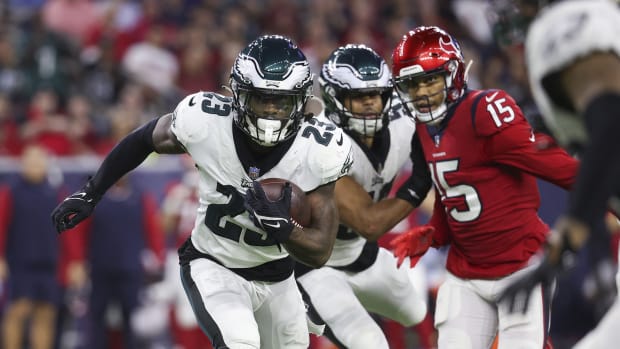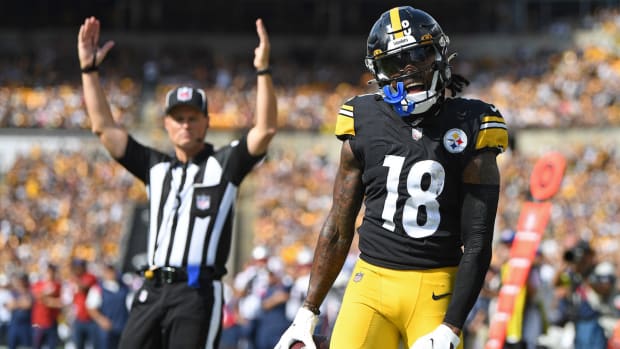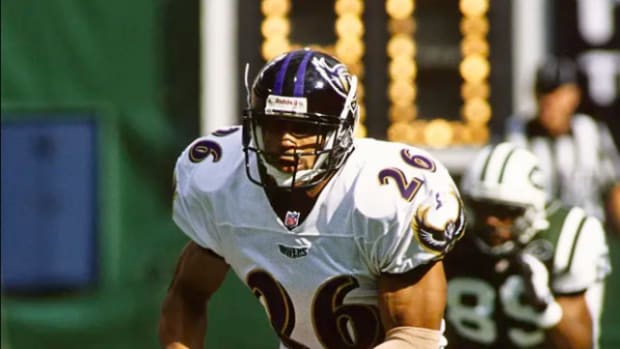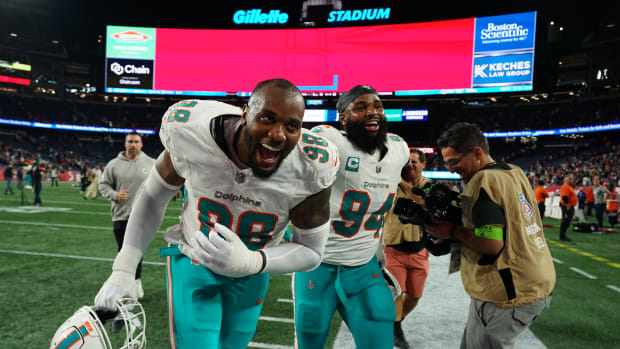Congratulations on Being Named a ‘Franchise Player’! Enjoy Your Kick in the Metaphorical Privates!

GENERAL MANAGER: Greetings, young man. I have summoned you to share some wonderful news. I know the contract you signed after we drafted you has recently expired. But in light of the value you’ve provided for our organization over the past four years and the bright future we believe is ahead for you, we have designated you our “Franchise Player.” You are simply too valuable for our organization to go without.
PLAYER: That is great news! I had told my agent that all I wanted was a contract in-line with other top players at my position. I’ve given my all for this organization and I’m thrilled to be here for the long haul.
GENERAL MANAGER: Well, we hope you're here for the long haul, too. But as our “Franchise Player”—again, congratulations—we’re just offering you a one-year tender. That is, unless you’re willing to sign a long-term contract for below market value, in which case we’d love to have you here for the long haul.
PLAYER: One year? But I’d get three times the contract length and three times the guaranteed money on the open market.
GENERAL MANAGER: [extended awkward silence] Yes.
PLAYER: This is patently offensive. Good day, sir. I believe I’ll take my services elsewhere.
GENERAL MANAGER: You can if you wish! However, there’s been an agreement made across all 32 organizations that any other organization signing you would have to award us two first-round picks. Therefore, with that cost factored in, no other team will offer you a contract.
PLAYER: Isn’t that collusion?
GENERAL MANAGER: It would be! But back in 1993, when this free agency thing threatened to destroy football and possibly life in America as we know it, we created the “franchise tag” designation, then unofficially known as the “Elway rule,” that allowed organizations to keep elite, essential talent that they couldn’t afford to lose. And ownership said, we’d only use it on MVP-caliber quarterbacks and players that would absolutely alter the face of the franchise if they left for another team.
PLAYER: But I’m not a quarterback.
GENERAL MANAGER: [extended awkward silence] Yes.
PLAYER: And I already played my first four seasons on an below-market contract due to the rookie wage scale.
GENERAL MANAGER: Which we also needed! There was once a fellow by the name of JaMarcus Russell who was very lazy. And the Oakland Raiders, an otherwise model organization at the time, drafted him first overall. But, very unfairly to the Raiders, who had their choice of any draft-eligible human on the planet, they were fooled by this super-villainous JaMarcus Russell and ended up paying him a large amount of money as the first overall pick only to have him play poorly and not work hard and wash out of the league. We couldn’t let other efficient, well-run organizations be victimized like that. So we, as a league, artificially deflated the contracts of all players coming into the NFL—with the union's blessing, somehow—forcing all new players to lock themselves into long-term, below-market contracts. And now, we front-office decision-makers are able to build teams through foolproof free-agent signings that work out 100% of the time. I defy you to name a single free-agent signee who did not play up to his contract, let alone present an exhaustive list that would take minutes, perhaps hours, to compile in full.
PLAYER: [opens mouth]
GENERAL MANAGER: Shut your stupid face. And best of all, the money that would have gone to you and other draftees during your first four seasons is now passed on to those veteran players who signed off on that 2011 CBA.
PLAYER: But the money has only been passed on to quarterbacks and the absolute top earners at all other positions. The second- and third-contract middle class who thought they were getting that money have not, and instead have gotten pushed out of the league early due to the cheap, locked-in rookie contracts flooding in. Not to mention, look at the situation I'm in now.
GENERAL MANAGER: Sounds like a great deal to me. And as an added bonus, those of us in front offices who, for instance, oversee runs of historic ineptitude are unironically celebrated for the draft picks—and therefore artificially cheap labor—collected as a reward for that ineptitude. So you see how it works out for everyone.
PLAYER: Except the players.
GENERAL MANAGER: [extended awkward silence] Yes, except the players.
PLAYER: So I spent four years playing as an unpaid intern in the NFL’s unofficial minor league. Then I spent the next four years playing on a far-below-market rookie contract that I was forced to sign. And even though that contract has now expired and I’ve reached the midpoint of my career, I’m prohibited from seeking out a contract that would reflect my market value, instead I have to play another season and avoid catastrophic injury in a sport rife with them. It seems like there’s an entire system built to prevent as many players as possible from receiving the money they deserve.
GENERAL MANAGER: That’s not true. For instance, do you play quarterback?
PLAYER: No.
GENERAL MANAGER: Oh. Then it is true. But the simple matter is: We need you to prove you deserve that money. To earn it. Just like our owner did. You know, our owner, the man we refer to as “Mister” as if we’re not all fully-grown adults.
PLAYER: How did he earn his money?
GENERAL MANAGER: He, like most NFL owners, was born into a family that had a Scrooge McDuck-level of wealth. And not Scrooge McDuck in the old Disney classics, but Duck Tales Scrooge McDuck. A literally cartoonish level of wealth that you could not fathom. And then he spent years alternatingly breathing in oxygen and emitting carbon dioxide. Avoiding the pitfalls that might cease that breathing. Drinking eight glasses of water a day rather than eight glasses of turpentine. Spending afternoons petting beloved family dog Pendleton rather than trying to lick the inside of a cobra’s mouth. Eating delicious things like cheeses and cured meats rather than industrial-size portions of rat poison. Breathing, again and again and again, hundreds of millions of times over the years, until his parents passed away, bequeathing to him the enormous fortune that he has earned.
And you, like him, can earn a small fraction of that fortune as long as you continue to thrive in physical and mental combat against world-class athletes at great risk to your short- and long-term health. Anyway, see you at training camp. And, again, I cannot congratulate you enough for earning this esteemed honor of Franchise Player.
And… scene.
I hope you enjoyed this preview of my upcoming musical, Joseph and the Amazing Technicolor Franchise Tag. (You should have imagined the entire exchange in song. “Aqualung,” maybe? If not please go back and re-read.)
The fact is, the Franchise Tag isn’t going anywhere. It affects a relatively small number of players every year. And anyway, considering what came out of the last CBA, the NFLPA is probably better off staying perfectly still—a la a Jurassic Park character encountering a T-Rex—during the next negotiation. I fear that a trade-off for eliminating the Franchise Tag will result in all players being compensated with 'Roger Goodell Fun Bucks' instead of U.S. currency, and the owners securing the right to hunt practice-squad players for sport.
But if the Franchise Tag truly exists primarily to help teams retain their own free agents (as opposed to keeping salaries low), the NFL should adopt the NBA’s “Bird Rights” approach. If a player is “franchise tagged,” discount, say, 15% of his annual salary from a team’s salary cap calculation. The player gets paid a fair wage. The organization keeps some cap flexibility and only has to spend some more cash, which should not be an issue for a league that essentially prints money. (Real money, not those Goodell Fun Bucks. At least not yet.)
Failing that, at the very least, how about some truth in branding? Instead of calling it the “Franchise Tag,” call it something along the lines of the following:
• Free agency cancelation tag
• Loss of employment freedom tag
• Undesired contract extension tag
• Restricted earnings and prohibited movement tag
Until then, the only good thing about the Franchise Tag is that, every time I think about it, this Simpsons clip comes to mind:
• Question or comment? Email us at talkback@themmqb.com.





































